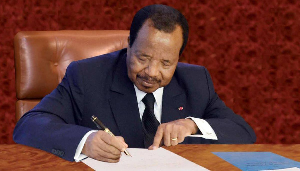A Paris-based Non-Governmental Organisation known as Action by Christians for the Abolition of Torture, ACAT, on January 21, at the Presbyterian Church, Ntamulung – Bamenda, launched the Pilot Project on the family Gender Equity for Development.
The project aims to empower women by improving their situations in the family circle through the equitable development and social justice empowerment of the various members of the family.
It will address the redistribution of privileges, roles and positions in the family, with the challenge to uphold gender equity in the customary and patriarchal context, in order to improve the development process of the families that are concerned.
Specific needs that the project will address include discriminatory family norms in terms of decision-making process, restricted physical integrity of the girl child, son bias, restricted resources and entitlements accorded to the girl child and the woman in terms of participation in family matters like inheritance, and restricted civil liberties in terms of understanding the rights and obligations of each family member.
Presenting an overview of the project, the National President of ACAT-Cameroon, Elizabeth Tatang and Irene Jokwi, said these forms of discrimination have been chosen in the hope that they are both burning and stimulating issues in their own right, that are, of course, exemplary since they are used to indicate some of the most frequent issues encountered in everyday scenario of a gender-based relationship in the family circle.
The National President of ACAT- Cameroon and its partners, at the launch, said issues over which families have control and women will be able to raise their voices, in a safe and respected environment to create an impact built into these activities, include; forced and early marriages, bride price, equal access to material resources for women and girls, freedom of expression, enhancement enjoyment of women’s rights - for example - not treating women as commodities that can be bought and sold, abusive widow rites, domestic and other violence, food taboos and prohibitions, sexual harassment.
Starting with Santa, Tubah, and Bafut Subdivisions, the project beneficiaries are, for now, going to be 25 families per village and on a speculative basis, some 9,000 persons are estimated to be indirect beneficiaries while 1,050 persons will benefit directly from the project.
The Regional President f ACAT Northwest, Sylvester Toh, said the driving force that hatched the project is because, in the Northwest Region, household chores are left in the hands of the women and children. The women are exposed to career interruptions and intermittent participation in the workforce on account of family chores.
Many women have no say in the number and spacing of children, and child-bearing is used as an instrument to hold down women.
He maintained that gender biases have caused women to withdraw from the public spheres of economic, social and political life and simultaneously fail to provide women with skills considered useful to their enjoyment of life.
"The family instead serves as a battleground for subtle affronts on the values, human integrity, dignity and rights of women which it ought to promote," Toh said.
The 2nd Assistant Senior Divisional Officer for Mezam, Daniel Motia Diony, lauded the initiative of ACAT, saying the project will help in emancipating women and girl children and called on project implementers to hit the road with optimism.
On behalf of the PCC, the Chairlady of PC Ntamulung, Jackie Kisob, said, as a faith-based organisation, she was confident that the high-level personalities that have been trained for several months to go and train people in villages through workshops will live up to expectation. However, she requested the facilitators to examine their lives before engaging themselves in the project.
The Director of the Centre for Human Rights and Peace Advocacy, Joseph Chongsi, who doubles as the President of Northwest Human Rights Organisations, described the project as intriguing and a big tool for family gender equity if development must be participatory. He called on men to listen and dialogue with their wives and girl children before taking any major decision that will affect their lives.
Réligion of Saturday, 30 January 2016
Source: The Post Newspaper














